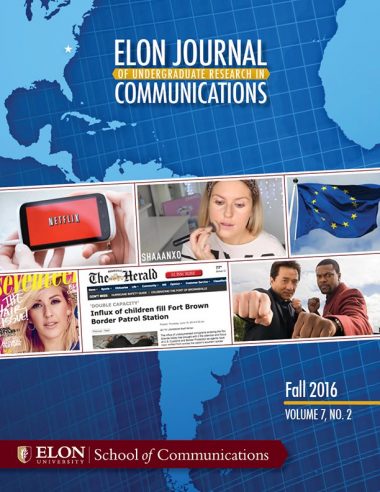This semester's edition marks the 14th in the history of the Elon Journal, the nation’s first and only undergraduate research journal in communications.
The School of Communications has published the fall 2016 issue of the Elon Journal of Undergraduate Research in Communications, featuring student work on topics ranging from the European Union’s framing of the European refugee crisis to an examination of advertising tactics used during the Great Depression.
 The issue contains 10 research papers authored by School of Communications students. The research studies highlight a diverse set of media subjects, such as legacy media, social media, advertising, television casting and nonlinear distribution methods.
The issue contains 10 research papers authored by School of Communications students. The research studies highlight a diverse set of media subjects, such as legacy media, social media, advertising, television casting and nonlinear distribution methods.
Three articles examine the portrayal of people in movies and newspapers, including a deep dive into how news organizations in Arizona and Texas reported on the influx of Latinos entering the United States in 2014. This study looked specifically at how media coverage of immigration framed children from Latin America.
Another three articles investigated advertisements, institutional messaging and humor to see how they used messages effectively. One author studied the material in Hannibal Buress’ stand-up comedy routines to determine which classical theories of humor his work employs, as well as persuasive methods used to engage audiences and address sociopolitical subjects.
Two articles looked at characteristics of popular social influencers in corporate-sponsored videos and successful talents in reality shows. The latter’s research included four in-depth interviews conducted with current television casting agents.
Lastly, the final two articles explored the role of women’s magazines, including one study that analyzed how mental health conditions including depression, anxiety and stress are represented.
Accompanying the online articles are video introductions by the authors, who explain their research methods and their interest in the topics they chose to study.
Byung Lee, associate professor in the School of Communications, serves as the journal’s editor. He assembled an editorial board of 27 communications faculty members who participated in the multiple blind-review process to select the best student work.
The Elon Journal began in spring 2010, with spring and fall editions each year. The fall 2016 journal marks the 14th edition.
“The students who published their paper in this issue should be congratulated for writing thought-provoking research papers,” Lee writes in his editor’s note. “I hope the articles in this issue will inspire students in future semesters to commit to examining important research questions and submit their papers to this journal.”
The Council on Undergraduate Research catalogs more than 200 student research journals in the nation, and the Elon Journal is the only one that focuses on undergraduate student research in journalism, media and communications.


